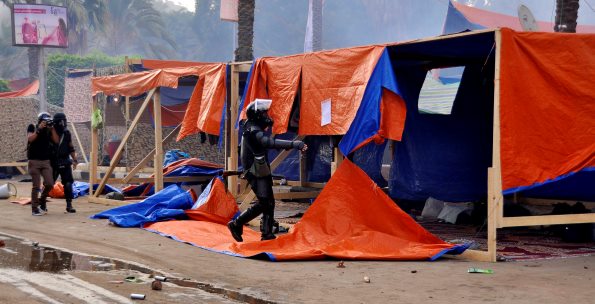The massacre perpetrated by the Egyptian junta regime on Aug. 14 might represent a tipping point not only for the country but also for others that supported the military coup from its onset. At this point, Gen. Abdel Fattah al-Sisi himself might be the most irrelevant person in the country. He was not a notable actor before and he shall not be a notable actor in the future. The actual source of the problem lies with forces that rest their entire understanding of Middle East geopolitics on al-Sisi’s intelligence and moral standards –much like the Russian and Iranian rationale that designated Bashar al-Assad as a watchman for the future of the Middle East.
At this point, the junta regime in Egypt has become entirely meaningless. Gen. al-Sisi led himself and everyone that marched behind him on July 3 to a dead end. The Salafis suffered greatly as Al-Azhar lost all credibility and the Coptic pope led himself and the rest of the country’s Christian community into a crisis. Meanwhile, Mohamed ElBaradei’s resignation marked a confession by pro-coup secularists and liberals to their mistakes. These are, of course, but overt supporters of the military coup. The situation at hand also represents a crisis for the coup’s actual supporters in the shadows: The military junta’s potential demise has now replaced fears of an Ikhwan takeover in the Gulf’s “most feared” list. And the West, having failed to acknowledge the military coup to give al-Sisi the green light, is now faced with a total moral and geopolitical crisis.
Meanwhile, there is ongoing talk of “Egyptian realities.” Commentators making the argument claim that the world will just have to live with those so-called realities. What they really mean is that there is a new government in Egypt and everyone should get used to them. Sure enough, they know that these “Egyptian realities” are sheer fiction. However, this is a final attempt to revive the Camp David Order – a futile effort indeed. They were quick to delve into dreams of the old order as they witnessed the Arab revolts’ difficulty in establishing a new order and political turbulence during the transition period. The genie, however, was already out of the bottle. Although over a thousand of people have lost their lives at the hands of the regime over the past five weeks, the crowds remain on the streets. While the regime seeks to lock away all the electricity that Egypt accumulated over the past century under imperialist rule, it seems to forget that electricity is a form of energy that you cannot simply store.
Unfortunately, it is not only their moral compass that is broken. They also have poor skills in geopolitical analysis and policy-making. Developments in Egypt and Syria escalated security threats to Israel tenfold compared to all other countries in the Middle East. Unless they do not adhere to conspiracy theories and believe chaos in the Middle East will serve their interests, everyone involved must understand that the situation at hand will harm their interests. After all, is it not their expectation from al-Sisi that he maintain the status quo at the expense of the Egyptian people and democracy? What was President Mohamed Morsi’s promise to his people? Did he not pledge to establish order and stability in a consolidated democracy? You did not let the man deliver on those promises. Now, the lack of stability in Egypt is everybody’s problem and not that of President Morsi.
To conclude, the crowds at al-Adawiyya Square have effectively turned Gen. al-Sisi’s dreams of a presidency into a nightmare. The world is now faced with a simple decision: Either it will follow al-Sisi’s worst nightmare or help restore democracy to the benefit of all parties involved. Without doubt, the latter option would require the release of President Mohamed Morsi and the rest of the Ikhwan leadership. A government of technocrats and a prime minister equipped with presidential powers must lead the







